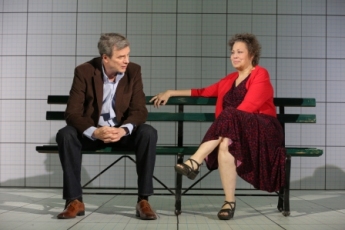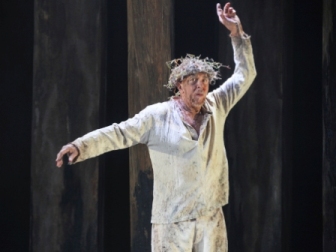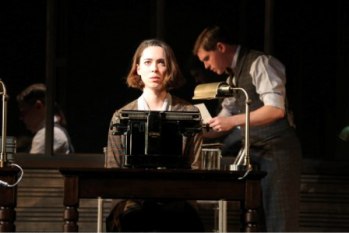Category: "Review"
Review: Love and Information
Feb 20th

A scene from Love and Information
(©Joan Marcus)
Caryl Churchill’s new play Love and Information features more than a hundred characters in some fifty short scenes ranging in length from a few seconds to several minutes, presented in rapid-fire succession. Here’s a quick summary of every single one of them:
Just kidding…that exercise would constitute a sheer overload of information. That’s perhaps the point of this typically audacious effort from the experimental playwright who’s given us such noteworthy works as Top Girls, Cloud Nine, Mad Forest and many others. Many of them received their American premieres at the New York Theatre Workshop, which is also presenting this play that debuted at London’s Royal Court Theatre.
Unfortunately, for all the daringness of its conceit, Love and Information is more numbing than illuminating about its titular themes. Resembling a series of half-baked ideas hastily jotted down in a notebook, it offers more potential than substance.
Veering from the comic to the tragic, the theatrical sketches are often frustratingly amorphous. Such moments as when a patient who’s been given a fatal diagnosis asking her doctor how long she has to live, a young woman informing her brother that she’s actually his mother, and a woman trying to explain the concept of physical pain to someone who can’t feel any deliver situations fraught with drama left unexplored.
Others, such as a man boasting about the virtues of his virtual girlfriend (shades of Spike Jonze’s recent film Her) or a waiter delivering countless linguistic variations of the word “table,” feel like undeveloped comedy sketches.
Certainly there’s no faulting the ingenious staging by James Macdonald or the endlessly versatile performances by the large ensemble composed of such estimable performers as Randy Danson, Jennifer Ikeda, Karen Kandel, Kellie Overbey, Maria Tucci, James Waterston and others. The action takes place within a gleaming white cube, with the quicksilver scene changes happening as if by magic. The soundtrack during the blackout transitions--ranging from The Simpsons theme music to industrial noises to the sound of babies crying—often humorously relate to the action.
Considering the sheer volume of the situations presented, it’s not surprising that some of them are amusing, moving or piquant. But few are memorable. The evening, running nearly two numbing hours, feels like the theatrical equivalent of a meal composed entirely of single bites from different dishes. It may fill you up, but it isn’t very satisfying.
Minetta Lane Theatre, 18 Minetta Lane. 800-982-2787. www.ticketmaster.com. Through March 23.
Review: Intimacy
Jan 30th

Laura Esterman and Keith Randolph Smith in Intimacy
(©Monique Carboni)
For a play that features, among other things, masturbation, ejaculations, fellatio, anal sex, suggestions of incest and frottage—look up that last one if you need to—Thomas Bradshaw’s Intimacy is remarkably wholesome.
Indeed, by the time this ribald comedy presented by The New Group reaches its conclusion, all of its characters are in a state of blissful harmony despite the profusion of sexual and racial tensions that have previously threatened to rend them apart.
It concerns three families living near each other in an upscale suburban town. Widower James (Daniel Gerroll) is still grieving for his late wife but finds himself consumed with sexual thoughts despite his stern religiosity. His sex-obsessed teenage son Matthew (Austin Cauldwell), an aspiring filmmaker, voyeuristically spies on Janet (Ella Dershowitz), the sexy girl next door, even while beginning a sexual relationship with Sarah (Dea Julien), the daughter of Fred (David Anzuelo), a contractor who pleasures himself to gay porn. Finally, there are Janet’s parents, bi-racial couple Jerry (Keith Randolph Smith) and Pat (Laura Esterman), whose healthy sex life has apparently inspired their daughter to become a porn actress.
Playwright Bradshaw has repeatedly stated in interviews that he doesn’t consider himself a provocateur, but the assertion seems disingenuous considering this work’s endless representations of sex and bodily functions as exuberantly staged by director Scott Elliott. Full-frontal nudity and graphic sex abounds, and only the most discerning, or close-up, will be able to differentiate the prosthetic penises from the real ones.
When he first learns that his daughter is posing in such magazines as Barely Legal, Jerry is aghast. But he soon finds himself indulging in sexual fantasies about her, even while sarcastically asking, after she comes home from work, “Did you have some nice orgasms?” His sexually liberated wife is far more supportive, arguing that their daughter having sex in front of a camera is simply “a career choice.”
The virginal Sarah won’t allow Matthew to have intercourse with her, but she happily uses his bodily fluids as a medicinal cream for her acne-plagued skin. Meanwhile, he comes to embrace his bi-sexuality after being graphically propositioned by her father.
Resembling nothing so much as a network sitcom if the censors had all been sent packing, the play ultimately centers on Matthew’s deciding to make an all-frottage porn film starring Janet and his father, the latter of whom gleefully sheds his inhibitions after becoming besotted by the comely young woman.
Making the hardly revelatory point that we’re all capable of extreme licentiousness under the right circumstances, the play, for all its graphicness, lacks the anarchic wit that would make it truly thought provoking. It mainly comes across as begging for attention, like a pathetic flasher trying to be caught.
The performers, ranging from such veteran pros as Gerroll, Esterman and Smith to the younger newcomers, are certainly game for anything, shedding their clothes and dignity in strained attempts to induce laughs and gasps. To their credit, they sometimes succeed, but in such moments as when Smith’s harried Jerry takes a relaxing toilet break to the auditory accompaniment of loud farting sounds, it’s hard not to feel sorry for them.
Ultimately, the play is far less than the sum of its, um, parts. Its relative tameness is illustrated when a scene from the notorious porn film Deep Throat is shown on a television monitor. Watching Linda Lovelace perform her trademark sexual act--and it’s impossible not to, despite the live actors onstage-- one is reminded of an earlier time when it was still possible to be genuinely shocked.
Acorn Theatre, 410 W. 42nd St. 212-239-6200. www.telecharge.com. Through March 8.
Review: Outside Mullingar
Jan 24th

Brian F. O'Byrne and Debra Messing in Outside Mulllingar
(©Joan Marcus)
Playwright John Patrick Shanley pours on the Irish blarney in Outside Mullingar, which strains mightily for Moonstruck-style whimsy but mainly falls flat. This shaggy dog romantic comedy receiving its world premiere courtesy of the Manhattan Theatre Club mainly sputters along to little effect until its climactic scene, which is both undeniably charming and mind-bogglingly silly.
Debra Messing of (TV’s Will and Grace, Smash) makes her Broadway debut here and is faced with the daunting task of affecting a Gaelic accent opposite her genuinely Irish co-stars Brian F. O’Byrne, Peter Maloney and Dearbhla Molloy. She only partially succeeds, but her luminous presence and sharp line readings overcome any linguistic difficulties.
The plot concerns single fortysomethings Anthony (O’Byrne) and Rosemary (Messing), both tending to elderly single parents while living in adjoining farms in the Irish countryside. It’s quickly evident that the chain-smoking, sardonic Rosemary has long harbored romantic feelings towards her neighbor, but Anthony, who has spent his adult years pining for a former childhood sweetheart, is oblivious.
Much of the 95-minute play’s running time is boringly concerned with a long-lasting feud between the two families, which has something to do with Anthony’s father Tony (Maloney) having once sold a right-of-way passage to his property to Rosemary’s father and now widowed mother (Molloy).
With the exception of an emotional late-night scene between Anthony and his dying father, the play mainly rambles, its discursive dialogue often unintelligible because of the thick accents. Things finally come to a head in the lengthy final scene, in which Anthony and Rosemary amusingly and movingly stumble their way towards redefining their relationship. Unfortunately, the ultimate revelation for the reason behind Anthony’s emotional withdrawal is so jaw-droppingly silly that it makes us wonder what the hell Shanley was thinking.
Director Doug Hughes, who had a far more successful collaboration with the playwright on the Tony Award-winning Doubt, is unable to bring much life to the strained proceedings, while the rustic sets and costumes, by John Lee Beatty and Catherine Zuber respectively, provide the proper Irish atmosphere.
The performances, at least, make it somewhat bearable, with Maloney and Molloy injecting sly moments of humor into their portrayals. Messing, seemingly channeling Maureen O’Hara, brings a winning charm to the feisty Rosemary, and O’Byrne expertly manages to make Anthony’s cluelessness both moving and endearing.
It’s nice to see Shanley attempting to return to his Irish roots. It’s too bad, then, that he seems to have taken a wrong turn getting there.
Samuel J. Friedman Theatre, 261 W. 47th St. 212-239-6200. www.Telecharge.com. Through March 16.
Review: King Lear
Jan 22nd

Frank Langella in King Lear
(©Richard Termine)
Following in Ian McKellen and Derek Jacobi’s recent footsteps in playing King Lear at BAM’s Harvey Theater, Frank Langella provides further proof that the Bard’s late classic has become an essential milestone for actors of a certain age. This production imported from the Chichester Festival Theatre seems to have little reason to exist other than as a star vehicle. But when you have as magisterial a performer as this one in the title role, not much more is required.
Angus Jackson’s staging is purely of the straightforward variety, with few directorial impositions. Robert Innes Hopkins’ set, dominated by massive wooden pillars, and period costumes, while handsome, are similarly undistracting. Thankfully, the play has not been updated to the fascist era, nor are there video screens to project an air of modernity.
Thus it falls on its star’s broad shoulders to bear the weight of this play which never quite has the psychological coherence that it should. And Langella handles the load with ease, despite his advanced age (he recently turned 76) and relative lack of Shakespearean experience. His performance is not particularly revelatory, but he touches the character’s myriad emotional bases with consummate skill.
His Lear displays few touches of the senility which many of his predecessors have suggested. Rather, he’s physically imposing and authoritative, his powerful baritone voice lending an innate majesty to his line readings. Fittingly, there’s more than a slight hint of one of his most famous roles, Richard Nixon, in his monarch’s inability to fully grasp how his power is slipping away. Railing at his fate while standing in the midst of a torrential rainstorm, he resembles a prehistoric creature in its death throes.
The supporting cast is solid if unspectacular, with a few weak links, such as Isabella Laughland’s bland Cordelia. Catherine McCormack and Lauren O’Neill are suitably fierce as the scheming Goneril and Regan; Denis Conway invests his Gloucester with a stirring gravitas; and Sebastian Armesto handles Edgar’s disguising himself as a madman with daring physical virtuosity. Best of all are Max Bennett, displaying leading man-style charisma as the treacherous Edmond, and Harry Melling (familiar as Dudley Dursley in the Harry Potter films), whose youthful demeanor provides unexpected dimensions to the Fool.
This is a more physical Lear than most, with Langella frequently physically manhandling his fellow players and Gloucester’s blinding depicted with a brutal intensity that wouldn’t be out of place in a horror film (the splats of his gouged out eyes hitting the floor are particularly squirm-inducing). But for all the intensity on display, the production never quite moves us as much as it should. Perhaps it’s time to retire the play for a little while, if only to gain some distance from it. Oh, never mind, there’s another production by Theatre for a New Audience, just around the corner from BAM, opening this spring.
BAM Harvey Theater, 651 Fulton Street, Brooklyn. 718-636-4100. www.bam.org. Through Feb. 9
Review: Machinal
Jan 17th

Rebecca Hall (foreground) with Jason Loughlin and Ryan Dinning (background) in Machinal
(©Joan Marcus)
The Roundabout Theatre Company’s current revival of Sophie Treadwell’s classic 1928 Expressionist drama Machinal represents a marked departure from this non-profit theater’s usual staid diet of Shaw and drawing room comedies. Featuring a galvanizing staging by up-and-coming British director Lyndsey Tuner and a striking scenic design Es Devlin, this production starring Rebecca Hall breathes new life into this rarely seen curiosity piece.
Inspired by the true story of Ruth Synder--who was executed for killing her husband and whose electric chair photo famously made the front page of the Daily News--the play is sometimes off-putting in its stylized language and stilted dramaturgy. But it fascinates nonetheless, both as an example of its dated theatrical style and its still powerful portrait of a hapless young woman victimized by an oppressive society.
Composed of nine “episodes,” the play depicts the ill-fated marriage between a “Young Woman” (Hall) and her boss (Michael Cumpsty) at the company where she works as a stenographer. When first seen, Helen, as she is referred to in the script, is frantically fleeing the cramped confines of an overcrowded subway car, and it soon becomes clear that this is merely the first example of her lack of coping abilities.
Subsequent episodes depict her strained relations with her co-workers and her endlessly nagging mother (Suzanne Bertish); her awkward honeymoon with her patronizing, overbearing new husband; her giving birth to an unwanted child; and her meeting with a sexy man (Morgan Spector, in the role originally played by a young Clark Gable) with whom she has a rapturous one-night stand. It’s only in the latter scene in which Helen seems to come to thrillingly vibrant life, giggling and acting like a giddy teenager when she previously seemed to wander through life in a dazed stupor.
This sexual awakening prompts her to brutally murder her husband, and she is quickly put on trial and sentenced to death. The play ends with her strapped in the electric chair, as a sudden bright light signals the switch being pulled.
The work is difficult to take at times, with its clipped, staccato dialogue and a stream-of-consciousness monologue that seems to go on forever. But its strengths are superbly realized in this suitably stylized production featuring a dazzling series of sets constantly shifting on the revolving turntable stage.
At first, Hall seems somewhat miscast in the lead role, with her striking beauty and amazon-like physique at odds with her character’s mousy demeanor and victim-like status. But her deeply committed performance eventually overcomes any reservations, and indeed makes Helen’s fate seem all the more tragic.
The ever-reliable Cumpsty and the physically imposing Spector offer excellent support as the central male characters; Bertish well conveys the mother’s grating qualities; and the large ensemble fills their multiple roles with skillful precision.
It was a gutsy move for this traditionally conservative theater company to put on this audacious production of such a challenging work. Fortunately for them and their audiences, that risk has been amply rewarded.
American Airlines Theatre, 227 W. 42nd St. 212-719-1300. www.roundabouttheatre.org. Through March 2.